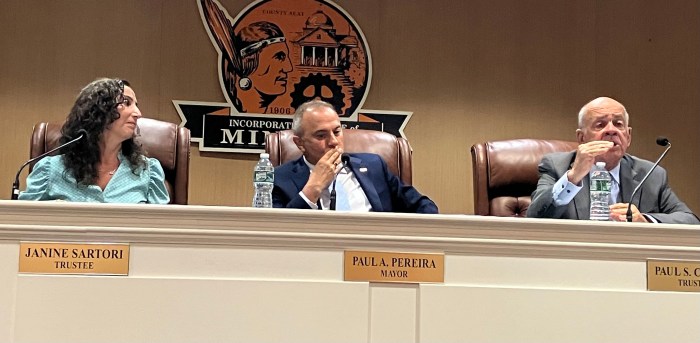The Village of Mineola won a favorable ruling earlier this month in Nassau County Supreme Court in a lawsuit brought by Bolla Management Corp. which sought to make its Jericho Turnpike gas station a 24-hour facility.
In her ruling, issued Jan. 3, Supreme Court Justice Karen Murphy stated that Bolla had agreed to a stipulation during public hearings in October and November 2013 before the Mineola Board of Trustees to limit hours of operation for the proposed Jericho Turnpike gas station and convenience store, to 5 a.m. to 11 p.m. and in a letter from its attorney, David Altman, reiterating its agreement to limit the business hours as stipulated at the public hearing.
 In that letter of Nov. 19, 2013, Altman acknowledged that Bolla “heard the residents’ concerns with regard to its use and operation of the premises” and asked that its agreement to the limited hours of operation be included in the company’s special use permit application.
In that letter of Nov. 19, 2013, Altman acknowledged that Bolla “heard the residents’ concerns with regard to its use and operation of the premises” and asked that its agreement to the limited hours of operation be included in the company’s special use permit application.
At the public hearings in Mineola, residents living in the neighborhood adjacent to the gas station vehemently objected to a 24-hour operation at the site because of the potentially disruptive impact it would have on the quality of life in their neighborhood.
In her ruling, Murphy also stated that she found Bolla’s argument that conditions had changed after it secured a license to sell beer on the premises “disingenuous,” because Bolla must have anticipated that it would be doing so.
“If they do appeal, we’re ready to fight that too, keeping Mineola the way Mineola wants it to be,” -Scott Strauss
Justice Murphy’s ruling followed a motion for summary judgment filed by Altman on Oct. 21, 2016.
Bolla filed the lawsuit on June 15, 2015, 18 months after the Mineola village board’s decision to grant the special use permit was filed in the village clerk’s office on Dec. 12, 2015.
“I’m glad we won the fight. They do have the option to appeal. If they do appeal, we’re ready to fight that too, keeping Mineola the way Mineola wants it to be,” said Mineola Mayor Scott Strauss.
Village attorney John Gibbons noted that Bolla had 30 days from the date of the ruling to file a notice of appeal, but he doubted the company would take further action in the case.
“I don’t anticipate they’re going to do that, it’s a very solid decision,” Gibbons said.
In countering Bolla’s contention that it had been pressured into accepting terms of operation that violated its rights under state and federal law, Gibbons noted that Bolla had 30 days after the board’s decision to file a proper appeal based on procedural grounds and had failed to do so.
Murphy wrote that Bolla’s filing was “untimely” and should have been a procedural appeal.
Gibbons said Bolla representatives had initially approached John Spellman, who was then village attorney, before filing their suit to explore the possibility of the village board amending its decision on the hours of operation.
During the public hearings before the board, Bolla Management Corp. CEO Harry Singh said all Bolla gas stations in the New York metropolitan area were 24-hour operations and that he was seeking the same license for the Mineola location.
Spellman consulted the village trustees and told Bolla they wouldn’t change their minds, according to Gibbons.
“They came back to the village attorney’s office and requested relaxation. We told them ‘No’,” Gibbons said, adding that both sides knew that Bolla “had blown their opportunity” to appeal the board’s decision on procedural grounds, in what is known as an article 78 filing.
“I thought the judge did a real good job,” Gibbons said of the court ruling. “I think those [arguments] were properly categorized as disingenuous. Their arguments weren’t consistent with the facts.”
Altman, an attorney with Harris Beach, could not be reached for comment on whether Bolla would appeal the decision.































